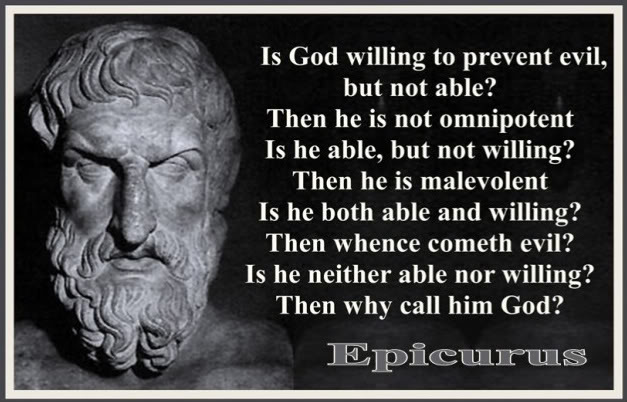
Seven Questions to Solve the Problem of Evil
Edip Yuksel
www.19.org
Our world is full of evils which cause enormous human pain and suffering throughout history. We can classify those evils under three categories:
- Natural evils, such as earth-quakes, volcano eruptions, hurricanes etc.
- Moral evils, such as, murder, torture, discrimination, racism, rape, theft, etc.
- Hybrid evils (combination of two), such as, pollution, AIDS, ozone depletion, starvation etc.
For Judaeo-Christian theology, including Islam, the existence of both God and evil creates one of the devilish paradoxes of all time. We can summarize this problem in three propositions:
- God is omnipotent and omniscient
- God is all good and merciful
- Yet, evil exists
The paradox or contradiction appears when a person accepts ALL of these three prepositions. If any two of them were true the third would be false. It seems that an all good and omnipotent God cannot exists simultaneously with evil. In other words, the concept of God in Judaeo-Christian theology is not compatible with this world contaminated with all kind of evils.
Theologians tried to solve the problem with a variety of solutions. However, a close analysis of those suggested solutions shows that they are fallacious. Analyzing those fallacious solutions is beyond the scoop of this paper. However, I will briefly touch some of them:
1. Evil is necessary as a means to good.
This suggested solution is possible only by rejection or restriction of the first preposition, that is the omnipotence of God. Can’t God create good without using evil as a means?
2. Evil is necessary as a counterpart to good.
Do all what we perceive have necessary counterparts? Many qualities seem to be relative to each other, not counterparts, such as short and long, big and small. What is the counterpart of blue, or red? Even if we grant that evil is necessary as a counterpart to good still a Judeao-Christian theologian will be troubled by the question: “How much evil is enough to satisfy this requirement? What is the minimum necessary dose of evil in order to expose the good?
3. Evil is due to human free will
Could not God create human in such a perfect way that they always choose the good with their free will?
Several questions to solve or discard the problem
I have several arguments which I think some or all of them may solve the problem. The solution may not be a conventional solution. I think your answers to the following questions will create foundations for a coherent argument for an alternative approach to the problem:
- Do you like to have freedom of choice, though you may sometimes suffer as the consequence of your own choice?
- Do you consider intelligent computers more advanced than today’s computers?
- Do you think that if your father gives you freedom which is limited by his list of “good” things can be really called “freedom”?
- Think of two creators: One can only create good but not evil. The other can create both. Which one of the two can be considered more omnipotent?
- Let’s assume that one day scientists will be able to create “intelligent computers” which can make their own choices with their free will. Should one of the computers make an error, who will you hold responsible for that error? If you hold the scientist responsible, won’t you be contradicting with your previous acceptance that computers have free will? What does “free” mean?
- Do you believe that you have free will?
- Are the all numbers of odd numbers equal to the all the numbers of all numbers?
I will base my argument on your logically possible answers to the above questions. Alas, I need to write a book.
But, I believe you can imagine my argument by thinking on your answers to my seven questions.
PS: This paper was written in 1993 for Paranormal Anthropology 301, Inst: Turner, T.A.: Beth Bohon


